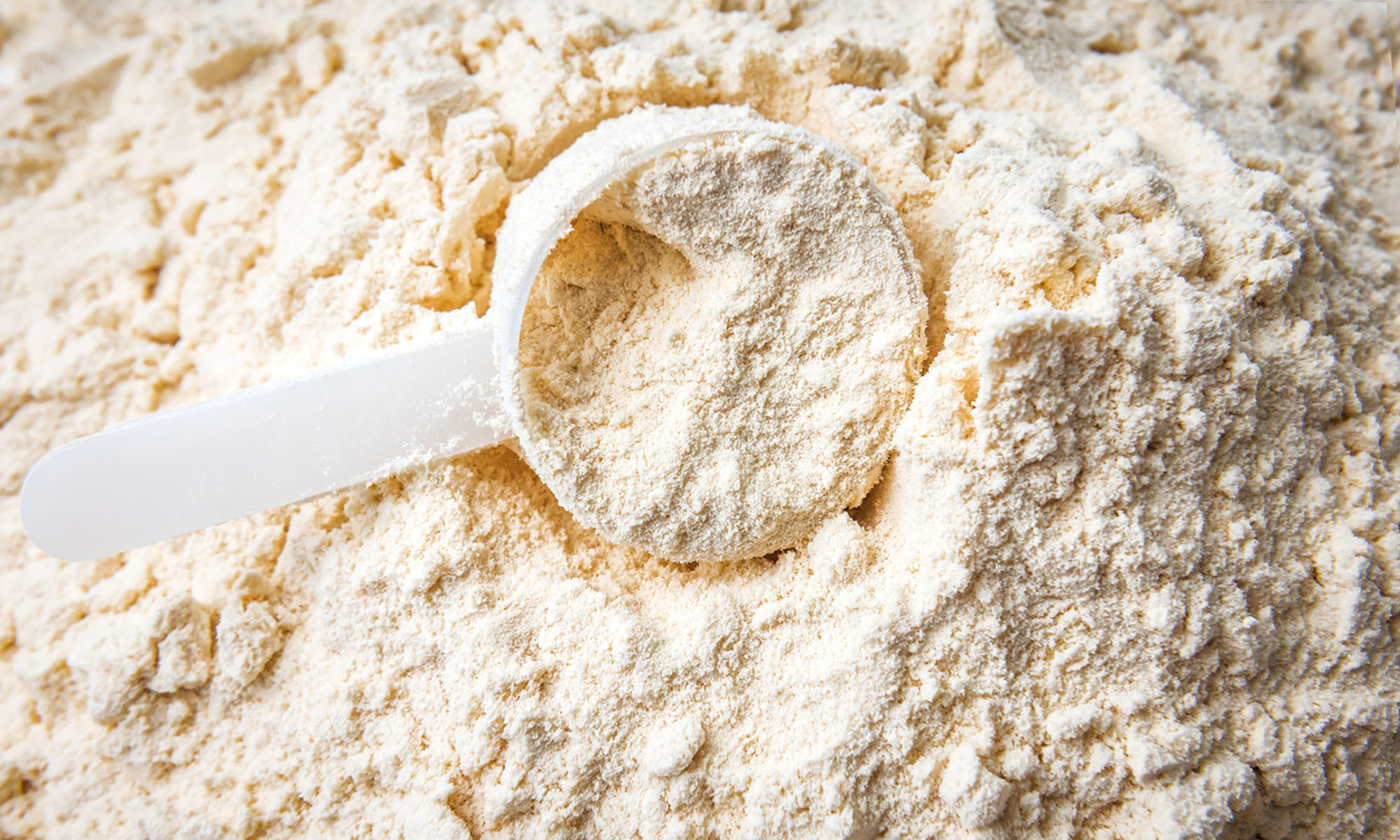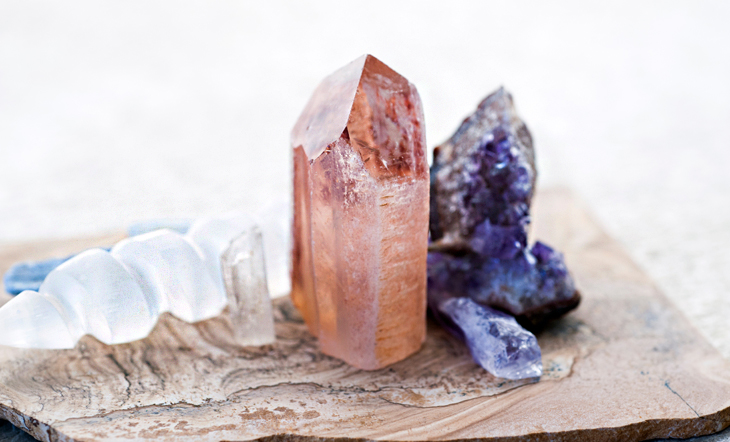This Is One Of The Best Plant Proteins — But How Does It Compare To Whey?
Comparing two of the most popular protein powders out there.


Certified holistic nutritionist
Certified holistic nutritionist
Adam Meyer is a health writer, certified holistic nutritionist, and plant-based athlete

Expert review by
Lauren Torrisi-Gorra, M.S., RD
Registered Dietitian
Lauren Torrisi-Gorra, MS, RD is a registered dietitian, chef, and writer with a love of science and passion for helping people create life-long healthy habits. She has a bachelor’s degree in Communication and Media Studies from Fordham University, a Grand Diplôme in Culinary Arts from the French Culinary Institute, and master's degree in Clinical Nutrition and Dietetics from New York University.
Image by vovashevchuk / iStock June 15, 2023 Our editors have independently chosen the products listed on this page. If you purchase something mentioned in this article, we may Pea and whey are two of the most popular protein powders out there—but is one better than the other? Here's what to know about the absorption rates, benefits, drawbacks, and potential side effects of pea protein versus whey, as well as what to look for when choosing between these protein heavyweights.
Advertisement
This ad is displayed using third party content and we do not control its accessibility features.
Pea protein
Pea protein is a rising star in the protein powder world due to its versatility and neutral taste, which allows it to blend easily into smoothies, shakes, and other recipes. Additionally, pea protein is easy to digest1, making it an excellent option for those with sensitive stomachs or digestive issues.
A plant protein, pea protein is typically made from yellow split peas2 that undergo a rigorous refinement process3 to extract their protein. It's typically found in three forms4: pea flour, pea protein concentrate, and pea isolate.
Pea protein has a Protein Digestibility Corrected Amino Acid Score (PDCAAS)5 of 0.78 to 0.91 depending on the product, making it one of the easiest plant proteins to digest (though it's still harder to digest than animal proteins like whey, which have a PDCAAS score of 1.0). This rate allows your body to efficiently use pea protein's essential amino acids (EAAs) for muscle growth, repair, and recovery following workouts. In one study, participants who supplemented pea protein experienced a greater increase in muscle thickness6 compared to those taking a placebo.
"Pea protein is a complete protein, meaning it contains all nine essential amino acids (including the branched-chain amino acids leucine, isoleucine, and valine) necessary for muscle protein synthesis to occur. For this reason, pea protein is effective in building muscle7, and multiple clinical trials support this," says Emily Werner, Ph.D., R.D., CSSD, a registered sports dietitian.
However, some people don't consider pea protein a complete protein since it is low in some essential amino acids, like methionine. It also contains less of the amino acid leucine than whey, making it less effective at promoting muscle protein synthesis.
Summary
Pea protein is an easily digestible plant protein and has a pleasant taste. It contains all nine essential amino acids and is comparable to an animal protein in terms of its potential to spur muscle growth, though it's lower in key aminos like leucine.
Advertisement
This ad is displayed using third party content and we do not control its accessibility features.
Pros of pea protein:
Advertisement
This ad is displayed using third party content and we do not control its accessibility features.
2.
It's good for those with lactose sensitivity.
3.
It's nutritionally dense.
Pea protein can boost the nutritional value of your diet since it's a rich source of essential nutrients9, including iron, fiber, and other vitamins and minerals.
Advertisement
This ad is displayed using third party content and we do not control its accessibility features.
4.
Plant proteins may reduce your chronic disease risk.
Cons of pea protein:
1.
It's lower in leucine than animal proteins.
Advertisement
This ad is displayed using third party content and we do not control its accessibility features.
What to look for when buying:
Allergens:
Pea protein is generally considered hypoallergenic15 and is well-tolerated by most individuals. However, it's essential to be aware of potential allergies or sensitivities to legumes, such as peanuts. Check labels for any cross-contamination or allergen warnings if you have specific allergies.
mbg's picks for clean pea proteins:
Whey protein
Whey protein is among the most popular protein powders, and for good reason: It's digestible and contains all nine EAAs for a complete amino acid profile16.
Whey protein is a byproduct of cheese production and is extracted when milk separates into curds and whey. The liquid whey is then processed further to remove water, lactose, and minerals, leaving behind a concentrated protein powder loaded with amino acids essential for muscle growth and recovery.
As for the taste, whey protein has come a long way from its chalky reputation. Nowadays, there's no shortage of delicious products with various flavors to incorporate into your routine for a protein boost.
There are two main types of whey protein: concentrate (WPC) and isolate (WPI). Whey concentrate is less processed17 and tends to have a lower protein content but offers more nutritional value since it contains more lactose and fat. Conversely, whey isolate is more refined than concentrate and contains less lactose and fat18, creating a product denser in protein per serving.
Whey protein boasts an impressive amino acid profile, including high levels of the BCAAs leucine, isoleucine, and valine. It also contains many other easy-to-digest essential and nonessential amino acids, contributing to its muscle-building prowess.
"Whey is a complete protein, meaning it contains all nine essential amino acids necessary for muscle protein synthesis. In addition, it's the best protein in terms of digestibility, with a PDCAAS score of 1.0. For these reasons, whey is the best protein for building muscle," says Werner.
Summary
An easily digestible byproduct of the cheese industry, whey protein is a complete protein with high levels of all BCAAs. It's the best protein for building muscle, though it's not suitable for vegans or those who are lactose intolerant.
Pros of whey protein:
1.
It's a complete protein.
A major benefit of whey protein is that it's a complete protein as it contains plenty of all nine essential amino acids necessary for optimal muscle growth and repair.
3.
It supports muscle building and healthy body composition.
Cons of whey protein:
1.
It's not suitable for vegans or those with lactose sensitivities.
Since whey protein is derived from milk, it's unsuitable for vegans and those with lactose intolerance or dairy allergies. Some people may experience digestive discomfort or mild allergic reactions21 to whey protein. Choose alternative protein sources if you have known sensitivities or allergies to milk.
What to look for when buying:
Allergens:
Whey protein contains lactose and milk proteins, so it's off the table for most people with lactose intolerance or dairy allergies. "Because whey protein is a milk derivative, there's a chance it will contain some lactose," states Werner.
Whey protein isolate has less than 1% lactose20, making it a safer option for those with lactose intolerance.
mbg's picks for clean whey proteins:
Is one better for you?
| Calories | 90 | 100 |
| Protein | 20 grams | 21 grams |
| Fat | 0.5 grams | 1.5 grams |
| Carbohydrates | 2 grams | 2 grams |
| Fiber | 1 gram | 1 gram |
| Calcium | 100 milligrams | 20 milligrams |
| Iron | 0.7 milligram | 6.3 milligrams |
| Leucine | 2.08 grams | 1.6 grams |
| Lysine | 1.82 grams | 1.4 grams |
| Methionine | 0.44 gram | 0.2 grams |
| PDCAAS Score | 1 | 0.78 - 0.91 |
Whey protein has long reigned supreme in the protein world due to its muscle-building benefits. Whey also offers a complete amino acid profile, high leucine content, and rapid absorption rate, making it an ideal choice for fueling muscle growth and recovery. "For someone who consumes an omnivorous diet, whey protein is the best option," explains Werner.
However, research shows that pea protein, with its balanced amino acid profile and impressive BCAA content, can be a good backup option for stimulating MPS and improving body composition24. For someone who can't consume whey, Werner adds that pea protein is one of the best of the plant protein options.
Both pea and whey protein can help those looking to lose weight. Whey protein has been shown to promote satiety25 and support weight loss by helping to retain lean muscle mass, and pea protein's high fiber content26 can help curb your appetite and prevent overeating.
Instead of choosing one over the other, you can also consider incorporating various high-quality protein sources from whole foods and protein powder supplements for a well-rounded nutrient intake.
Whole food proteins such as vegetables, whole grains, legumes, nuts, lean meats, and seeds offer additional nutritional benefits, including fiber, vitamins, and minerals not found in isolated protein powders.
Summary
Both whey protein and pea protein are effective for building muscle, though whey protein has an edge thanks to its more complete amino acid profile. Plant-based eaters can still reap most of the same benefits with a pea protein powder, though they will have to consume larger servings to get enough essential amino acids like leucine.
What to look for in a high-quality protein
Reading nutrition labels is vital when choosing a high-quality protein powder. Look for brands that display their amino acid ratio on the package, contain little to no sugar, are free from additives, and provide a transparent breakdown of their nutritional quality. Don't settle for brands that keep you in the dark—choose the ones that lay it all out there for you to see, and choose what works best for your health and fitness goals.
Werner states that a high-quality protein powder will be third-party tested, contain all nine essential amino acids, and provide at least 20 grams of protein per serving.
RELATED READ: What To Look For In A Complete Vegan Protein Powder + 8 Top Options
FAQ
Can you build muscle with pea protein?
Absolutely! Pea protein is a muscle-building powerhouse. Packed with essential amino acids and around 2 grams of leucine per 25 gram serving, pea protein provides the building blocks your muscles need for muscle growth and repair.
Is pea or whey protein better for muscle gain?
Is pea protein or whey better for weight loss?
The takeaway
Pea protein is rising in popularity due to its versatility and high digestibility, while whey protein is known for its complete amino acid profile and rapid absorption. Research reveals that both proteins can support muscle growth, weight loss, and body composition. When selecting a protein powder supplement, consider factors such as protein content, amino acid profile, and quality ingredients.
Instead of choosing one protein over another, the best approach is to include several high-quality protein sources in your diet from a combination of whole foods and supplements for optimal nutrition.

 Lynk
Lynk 































